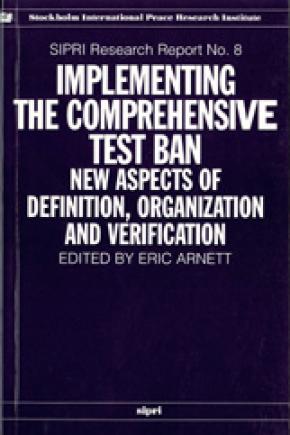Implementing the Comprehensive Test Ban: New Aspects of Definition, Organization and Verification
This report provides up-to-date information on the four main technical issues which will present the greatest challenges to the implementation of the comprehensive test ban treaty being negotiated at the Geneva Conference on Disarmament: formulating an appropriate definition of the term 'nuclear test', verifying compliance with the treaty's provisions, prohibiting preparations for testing, and creating the organization for effective implementation. The report is written in such a way that it offers important background to the non-specialist while providing timely guidance to policy makers and others involved in the public debate of these issues. It is designed to support prompt completion of the treaty by suggesting ways in which disputes over contentious issues can be resolved speedily.
Highlights and key conclusions
- While it may be desirable for the nuclear weapon states unilaterally to renounce hydronuclear experiments, explosions that release a very small amount of nuclear energy, a ban on such experiments should not be included in the CTB.
- Although there is merit to the Swedish proposal that pre-test activities be banned, such a ban adds little to the power of the norm of not testing embodied in the CTB and should not be included in the treaty.
- The treaty should provide for a verification network of seismic and atmospheric monitoring stations to be co-ordinated by the treaty's implementing authority through its International Data Centre, but this network should not be owned and operated by the authority. Additional technologies should be operated by the states parties, but need not be included in the CTB verification system given the range of national, international and private means of monitoring available.
- The treaty is likely to provide for mandatory inspections only in rare cases, after significant seismic events and international consultation and clarification. Additional inspections and data might be offered by states parties voluntarily as a confidence-building measure.
- The CTB implementing authority will be centralized in the sense that data on treaty-related activities will be collected, analysed and distributed to all states parties. This will provide for more egalitarian participation than some cold war proposals, and should be matched by equitable procedures for settling disputes and other decision making.
- Changes in domestic politics in Russia and the USA could stymie conclusion of the CTB unless progress is made quickly in 1995, even if the goal of concluding the treaty before the NPT Review and Extension Conference is not met.
- New information provided to the authors indicates that China will test once or twice more before signing the treaty. These tests should be recognized as steps toward creating the conditions for China to sign the treaty rather than a challenge to the CTB's norm.
1. Introduction and executive summary
Eric Arnett
2. The problem of definition: Just what is a nuclear weapon test?
Annette Schaper
3. The proscription on preparing to test: Consequences for verification
Eric Arnett
4. The complementary roles of national, private and multinational means of verification
Eric Arnett
5. Organizing for effective implementation
Patricia M. Lewis
Appendix A. The Swedish Draft Comprehensive Nuclear Test-Ban Treaty
Appendix B. Comprehensive Test Ban Treaty: Australian Resource Paper on Draft Treaty Elements

